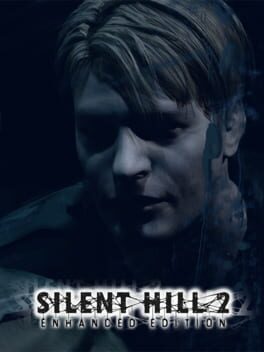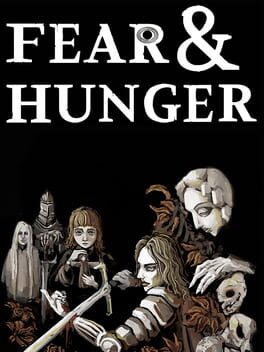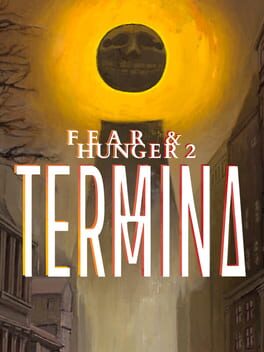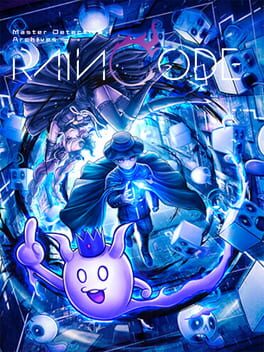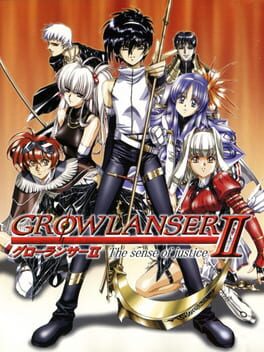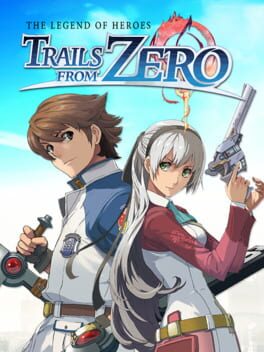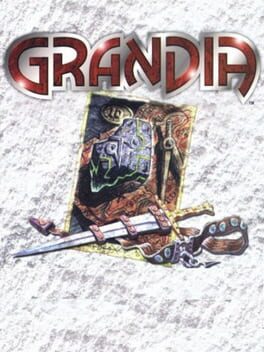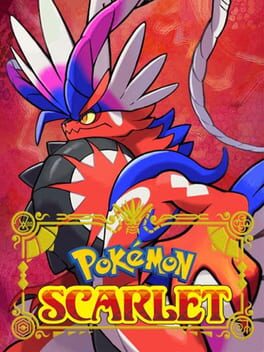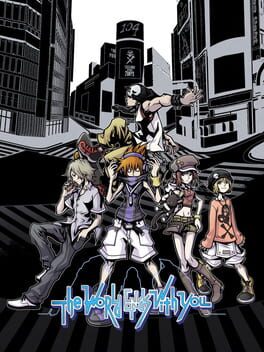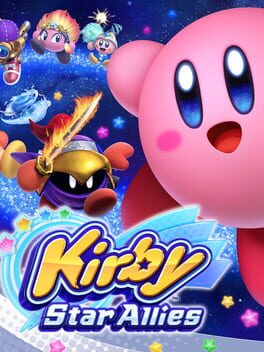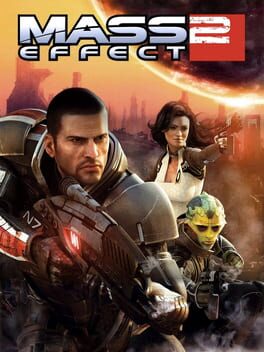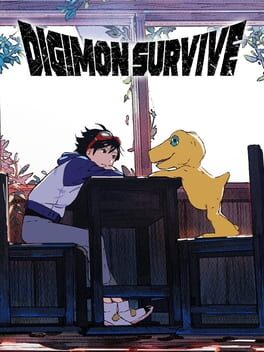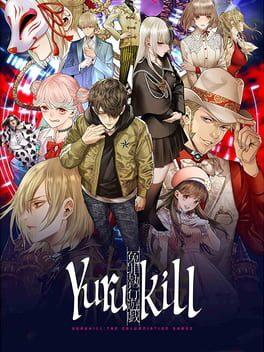Ramaladni
23 Reviews liked by Ramaladni
Solid door-checking simulator.
It's an interesting story but it feels very padded out with unnecessary/uninteresting gameplay that ranges from dull to frustrating. If someone could turn this into a good novel that would be ideal.
All that being said, there's something to the depth and complexity of the characters and their motivations and the way these are metaphorically manifested that I just can't shake. I find the voices, dialog, and animations to be wonderfully weird and indelible. I like to think that the fatal act at the center of the story is not to be taken literally. James has enough to feel guilty about.
It's an interesting story but it feels very padded out with unnecessary/uninteresting gameplay that ranges from dull to frustrating. If someone could turn this into a good novel that would be ideal.
All that being said, there's something to the depth and complexity of the characters and their motivations and the way these are metaphorically manifested that I just can't shake. I find the voices, dialog, and animations to be wonderfully weird and indelible. I like to think that the fatal act at the center of the story is not to be taken literally. James has enough to feel guilty about.
Fear & Hunger
2018
Starting my "replay" of Termina I did not really expect to glean much more than I had from my first playthrough of this game. I absolutely adored the game more than I have most other games and I've viewed as much content as I could find online for it. I thought I knew every inch of this game, every single intricate mechanic, character interaction, etc.
And this couldn't be any further from the truth.
My most recently completed run was with Abella, I got endings B and C on the same save file and I have so much more to appreciate this game for in this run now that I've seen all of the general endings firsthand. The sheer level of labour put into this game is inconcievable to me. Just the quality put into an rpgmaker game alone leaves me dumbfounded. Building upon the world, mechanics, and systems present in the first game in such a splendid manner. I have spent many hours merely thinking about this game and truly I cannot find anything to complain about.
Diversity in this game just breathes so much life and uniqueness to the world of Fear & Hunger. Just within the 8 playable characters, there's so many attributes that give each character their own distinict feel. In design, combat, and even just how you go about the navigating the world. Every playthrough feels magnitudally different just by the starting character alone. The soul absorbption mechanic adds on to this and creates so much depth for the progression system and understanding of the lore and game world. I've poured so many hours into perusing the wiki and watching too many a video covering unique interactions between the cast members and how they interact with the world. Mind Read, Diagnosis, and the Party Talk are all so intricately created it genuinely breaks my fucking mind to think that this game was produced by one person.
Combat once again follows in the foundation established by Funger 1. Though remaining more-or-less the same, the new REV system brings so much more depth to combat and I love it. The already complicated puzzle that is within each encounter now has an additional layer of which has heavy impact on the outcomes. Management of REV points could be the make or break for an encounter, and being so limited on how many you can store in your backend at a time PLUS being forced to commit to REV point usage adds so much stress to the gameplay itself. It really does wonders for establishing the brutal and ruthless resource management that this game has.
Style is something that I will infinitely praise this game for. I've watched some of the speedpainting videos, listened to every track (some hundreds of times over), and read through just about all of the dev's comments to other people regarding the music. Thematically the game never falls short and everything feels just so perfect. Again, it's so fucking mindblowing to me that this game even came to exist.
Funger's in-game world captivates me the most. All of the textbooks, flyers, papers, diaries, newspapers, everything. Nothing feels cheap in its delivery and nothing feels superfluous in its inclusion. I've read all of the pocketcat tales, all of the bibles, I cannot understate just how much I love how everything ties together both from the prior entry and from this one. Dialogues aside, the actual spritework and level design for the game itself is so magnificent and beautiful. Environments are put together and tracks are paired together like a match made in heaven. I cannot recall a moment where I've felt underwhelmed with the music and environment or annoyed with the design of an area. It's beautiful through and through. Character's and their relations to the world also do much to add depth and vibrancy to the characters themselves and those surrounding them. Again, the Party Talk and Mind Read mechanics are so perfectly executed and insanely deep. Nearly 3 hours of party talking paired with the mind reading ability (spoilers for obvious reasons). There's so much that you will miss out on sheerly because you don't play the game a certain way or don't unlock whatever skill. Characters in your party are also important because the Party Talk has unique dialogue based on those present/absent from the party. Words cannot express how much I love this system and how quite frankly fucking insane you have to be to put together all of this dialogue singlehandedly knowing that 90% of the playerbase won't even read a fraction of the interactions.
Miro has done a wonderful job with putting together such a game nearly singlehandedly. It's this game and Metal Gear Solid 2 that I believe are truly works of art. I'll admit I'm cranking out this "review" as something of a obligation because I want to write something of much grander scale but I lack the first-hand experience to do so. Think of this as something of a prelude if you would.
I'm currently 43 hours in and starting another run as Marina. This shit is crack. Help me.
STEAMDECK ADDENDUM:
I played this game on Steam Deck and it runs pretty OK. I'd suggest playing this on windows if possible. Unless you are running the latest protonGE version & the protondb fix for the game, you'll be fighting against massive fps drops very often.
And this couldn't be any further from the truth.
My most recently completed run was with Abella, I got endings B and C on the same save file and I have so much more to appreciate this game for in this run now that I've seen all of the general endings firsthand. The sheer level of labour put into this game is inconcievable to me. Just the quality put into an rpgmaker game alone leaves me dumbfounded. Building upon the world, mechanics, and systems present in the first game in such a splendid manner. I have spent many hours merely thinking about this game and truly I cannot find anything to complain about.
Diversity in this game just breathes so much life and uniqueness to the world of Fear & Hunger. Just within the 8 playable characters, there's so many attributes that give each character their own distinict feel. In design, combat, and even just how you go about the navigating the world. Every playthrough feels magnitudally different just by the starting character alone. The soul absorbption mechanic adds on to this and creates so much depth for the progression system and understanding of the lore and game world. I've poured so many hours into perusing the wiki and watching too many a video covering unique interactions between the cast members and how they interact with the world. Mind Read, Diagnosis, and the Party Talk are all so intricately created it genuinely breaks my fucking mind to think that this game was produced by one person.
Combat once again follows in the foundation established by Funger 1. Though remaining more-or-less the same, the new REV system brings so much more depth to combat and I love it. The already complicated puzzle that is within each encounter now has an additional layer of which has heavy impact on the outcomes. Management of REV points could be the make or break for an encounter, and being so limited on how many you can store in your backend at a time PLUS being forced to commit to REV point usage adds so much stress to the gameplay itself. It really does wonders for establishing the brutal and ruthless resource management that this game has.
Style is something that I will infinitely praise this game for. I've watched some of the speedpainting videos, listened to every track (some hundreds of times over), and read through just about all of the dev's comments to other people regarding the music. Thematically the game never falls short and everything feels just so perfect. Again, it's so fucking mindblowing to me that this game even came to exist.
Funger's in-game world captivates me the most. All of the textbooks, flyers, papers, diaries, newspapers, everything. Nothing feels cheap in its delivery and nothing feels superfluous in its inclusion. I've read all of the pocketcat tales, all of the bibles, I cannot understate just how much I love how everything ties together both from the prior entry and from this one. Dialogues aside, the actual spritework and level design for the game itself is so magnificent and beautiful. Environments are put together and tracks are paired together like a match made in heaven. I cannot recall a moment where I've felt underwhelmed with the music and environment or annoyed with the design of an area. It's beautiful through and through. Character's and their relations to the world also do much to add depth and vibrancy to the characters themselves and those surrounding them. Again, the Party Talk and Mind Read mechanics are so perfectly executed and insanely deep. Nearly 3 hours of party talking paired with the mind reading ability (spoilers for obvious reasons). There's so much that you will miss out on sheerly because you don't play the game a certain way or don't unlock whatever skill. Characters in your party are also important because the Party Talk has unique dialogue based on those present/absent from the party. Words cannot express how much I love this system and how quite frankly fucking insane you have to be to put together all of this dialogue singlehandedly knowing that 90% of the playerbase won't even read a fraction of the interactions.
Miro has done a wonderful job with putting together such a game nearly singlehandedly. It's this game and Metal Gear Solid 2 that I believe are truly works of art. I'll admit I'm cranking out this "review" as something of a obligation because I want to write something of much grander scale but I lack the first-hand experience to do so. Think of this as something of a prelude if you would.
I'm currently 43 hours in and starting another run as Marina. This shit is crack. Help me.
STEAMDECK ADDENDUM:
I played this game on Steam Deck and it runs pretty OK. I'd suggest playing this on windows if possible. Unless you are running the latest protonGE version & the protondb fix for the game, you'll be fighting against massive fps drops very often.
Celeste
2018
### Stopped playing after a couple chapters ###
+ Great music
+ Good art
+ Weird murder puzzles
- Writing is soooo boring
- Pacing is awful
- Framerate is distractingly low
- Literally none of the suspects are even named characters; the stakes are so low
- Everyone from ch.0 goes away and the new cast is even less interesting with less setup
- ch.2 is just the same gimmick so many times
- Shinigami is soooo fucking annoying she needs to talk like 75% less
- Main character is overly stupid in a way that feels annoying rather than just being a stand-in for the player not knowing answers
- Amnesiac MC is so overdone and really doesn't do anything to endear me to him
+ Great music
+ Good art
+ Weird murder puzzles
- Writing is soooo boring
- Pacing is awful
- Framerate is distractingly low
- Literally none of the suspects are even named characters; the stakes are so low
- Everyone from ch.0 goes away and the new cast is even less interesting with less setup
- ch.2 is just the same gimmick so many times
- Shinigami is soooo fucking annoying she needs to talk like 75% less
- Main character is overly stupid in a way that feels annoying rather than just being a stand-in for the player not knowing answers
- Amnesiac MC is so overdone and really doesn't do anything to endear me to him
Um jogo com uma proposta interessante, mas que carrega os problemas que infestam Danganronpa sem ter o mesmo apelo. Para fãs do gênero, é uma boa recomendação, contanto que se preparem para um polimento pobre e um preço salgado.
Conta com um mistério intrigante o suficiente e que possui resoluções altamente satisfatórias; os personagens são, em maioria, charmosos, mas não possuem o mesmo ênfase que seus “predecessores”. Em vez disso, a estrela é a cidade de Kanai Ward, que é viva, idealizada e a verdadeira protagonista da história.
Falando em protagonista, Yuma Kokohead (sim, esse é o nome dele) é digno de seu cargo, tendo um desenvolvimento bem idealizado ao longo da narrativa, graças à dinâmica com sua companheira, Shinigami, que consegue ser encantadora e irritante em doses parecidas. Por si sós, ambos deixam a desejar, mas suas personalidades se completam muito bem, tornando-os inseparáveis.
O resto do elenco também e forte, mas em é, em maioria, mal utilizado. Causam uma primeira impressão forte, e cada um é enfatizado em um capítulo “próprio”, mas em geral ficam em segundo plano dando espaço a personagens menores e menos interessantes.
A gameplay é simples e dividida em três fases: exploração, investigação, e mystery labyrinth. A primeira fase , com um mapa pequeno mas rico em detalhes e bem povoado, com missões secundárias criativas que ajudam na construção do mundo. A segunda fase é um híbrido entre a primeira e uma gameplay clássica point and click, onde o protagonista analisa cenários e coleta evidências. A terceira fase é a mais louca, e envolve caminhar por uma “materialização do mistério”, em formato de um labirinto linear (e psicodélico). Lá, as evidências coletadas ao longo da investigação são discutidas em minigames variados e envolvidos, similares aos de Danganronpa mas mais bem-trabalhados. Em contrapartida, a lógica é simples e carente de claridade, e consiste em refutar fatos que são óbvios mas apresentados de forma contra-intuitiva.
Rain Code é um daqueles jogos que acerta nos ingredientes mas erra no preparo; é cru e inconsistente. É possível ignorar as partes sujas para aproveitar o diamante que está escondido, mas o custo pode ser alto para alguns. No meu caso, valeu a experiência e meu tempo.
Conta com um mistério intrigante o suficiente e que possui resoluções altamente satisfatórias; os personagens são, em maioria, charmosos, mas não possuem o mesmo ênfase que seus “predecessores”. Em vez disso, a estrela é a cidade de Kanai Ward, que é viva, idealizada e a verdadeira protagonista da história.
Falando em protagonista, Yuma Kokohead (sim, esse é o nome dele) é digno de seu cargo, tendo um desenvolvimento bem idealizado ao longo da narrativa, graças à dinâmica com sua companheira, Shinigami, que consegue ser encantadora e irritante em doses parecidas. Por si sós, ambos deixam a desejar, mas suas personalidades se completam muito bem, tornando-os inseparáveis.
O resto do elenco também e forte, mas em é, em maioria, mal utilizado. Causam uma primeira impressão forte, e cada um é enfatizado em um capítulo “próprio”, mas em geral ficam em segundo plano dando espaço a personagens menores e menos interessantes.
A gameplay é simples e dividida em três fases: exploração, investigação, e mystery labyrinth. A primeira fase , com um mapa pequeno mas rico em detalhes e bem povoado, com missões secundárias criativas que ajudam na construção do mundo. A segunda fase é um híbrido entre a primeira e uma gameplay clássica point and click, onde o protagonista analisa cenários e coleta evidências. A terceira fase é a mais louca, e envolve caminhar por uma “materialização do mistério”, em formato de um labirinto linear (e psicodélico). Lá, as evidências coletadas ao longo da investigação são discutidas em minigames variados e envolvidos, similares aos de Danganronpa mas mais bem-trabalhados. Em contrapartida, a lógica é simples e carente de claridade, e consiste em refutar fatos que são óbvios mas apresentados de forma contra-intuitiva.
Rain Code é um daqueles jogos que acerta nos ingredientes mas erra no preparo; é cru e inconsistente. É possível ignorar as partes sujas para aproveitar o diamante que está escondido, mas o custo pode ser alto para alguns. No meu caso, valeu a experiência e meu tempo.
Growlanser II: The Sense of Justice expanded the debut's idea in all sorts of different directions. Firstly, it introduced an additional layer of complexity with its weapon augments system, as the template evolved to a mission-oriented progression similar to Tactics Ogre. This change created a vast space for plenty of story choices, branching storylines, subplots, relationships, side quests and endings. Despite the heavy war themes, its many scenes still held a fair bit of comedic personality and boasted character/world building in spades, acheiving a sort of multifaceted construct that's equal parts heartfelt, dramatic, verbose, playful and sophisticated. However - while there's an impressive degree of mission variety scattered around, some of which tend to highlight a few frustrating shortcomings in its awkward movement, AI and collisions.
Grandia
1997
Pokémon Scarlet
2022
I enjoyed the game, and I really admire how it fully utilizes the DS' hardware, but I didn't love it.
It's combat system is unique, and the game overall is very ambitious and I appreciate it for that.
I find the combat to be disorienting, especially going back and forth between the top and bottom screen. It's hard for me to go back and forth, I struggle to make sure I'm doing the combos that I want on the top screen while keeping Neku alive on the bottom and vice versa. Auto-partner kind of helps, but they can't really make it super efficient without making it OP, and I wonder if other ports of the game handled it better. It didn't help that I played this on a New Nintendo 2DS XL, which has a really shitty stylus that is painful after extensive use. I think if I had played it on original hardware, I might've had an easier and less painful time with it.
I think that the overworld isn't particularly fun to explore, you're kind of just going back and forth across the same screens with little to do except shop or fight Noise. I also wish that the Reaper tasks were more varied than just fight Noise, bring me something, or Reaper Review.
I think it's a mostly solid game, and I really respect it for its ambition, but it didn’t totally gel with me.
It's combat system is unique, and the game overall is very ambitious and I appreciate it for that.
I find the combat to be disorienting, especially going back and forth between the top and bottom screen. It's hard for me to go back and forth, I struggle to make sure I'm doing the combos that I want on the top screen while keeping Neku alive on the bottom and vice versa. Auto-partner kind of helps, but they can't really make it super efficient without making it OP, and I wonder if other ports of the game handled it better. It didn't help that I played this on a New Nintendo 2DS XL, which has a really shitty stylus that is painful after extensive use. I think if I had played it on original hardware, I might've had an easier and less painful time with it.
I think that the overworld isn't particularly fun to explore, you're kind of just going back and forth across the same screens with little to do except shop or fight Noise. I also wish that the Reaper tasks were more varied than just fight Noise, bring me something, or Reaper Review.
I think it's a mostly solid game, and I really respect it for its ambition, but it didn’t totally gel with me.
Kirby Star Allies
2018
Mass Effect 2
2010
The second part of the legendary trilogy has received significant improvements since the first part. The plot is intriguing from the first minutes of the game. Many new charismatic characters and interesting missions appeared. The main story is full of mystery, drama, suspense, and epic. Graphically, the game has received noticeable improvements. Music accompaniment is one of the best in the history of games. The gameplay has become even more diverse and dynamic than in the previous part. The number of weapons and abilities has increased significantly. Some of them are so powerful that they'll make you complete the final game in a few seconds. Literally! Resources grind missions now without landing on the planets themselves. However, endless baggage was removed.
This is another great game of a great trilogy!
This is another great game of a great trilogy!
Digimon Survive
2022
Digimon Survive is an attempt on my life. I know not who I have angered at Bandai Namco nor what I have done to deserve such attention, but I have clearly been designated TWTL: Too Wild To Live. I can summon no better explanation for this game and the specificity of its many faults. Someone wants me dead, and they have invested several million dollars into enacting my subtle doom.
I shall not go quietly into this long night. I will not be defeated by Digimon Survive. If I am to be silenced by such a neurotoxin, my enemies will need to up my dosage.
Let me explain.
I have been an ardent lover of Digimon since the English dub of Digimon Adventure (the original show, to ye outsiders) first aired on the Fox Kids Network in 1999. I was seven years old, and had been raised primarily by Pokemon and Power Rangers. From that day until this one, my loving has not lapsed. I have watched Adventure and Tamers a half-dozen times each. On my desk sit an etsy-made tag and Crest of Friendship and a classic 90's style Digimon V-pet. Every day I am pierced by needles of guilt as I remember that my plush Terriermon languishes in a large cardboard box rather than on proud display in this too-small apartment bedroom. It has only been a few days since I unboxed my Vital Bracelet. I have played and loved numerous visual novels. I have played and loved even more tactical RPGs. I am as ripe and juicy a specimen of this Digimon product's target demographic as I was for Digimon Adventure in 1999.
Somehow, against all odds, this is not what any of us wanted... but we'll talk about that later. First, a great deal of positivity.
Digimon Survive is drop-dead gorgeous, and the Japanese voice cast delivers their absolute best. Even as someone who does not speak Japanese (yet... every day my power grows) their delivery enhances the experience. The soundtrack is of similar quality. With regard to presentation and aesthetic, I have nothing but good things to say about Digimon Survive.
It may surprise you, reader-of-reviews, to know that I have no significant criticism of Digimon Survive's combat either. Unlike nearly every other voice I have heard on the topic, I feel that the turn-based tactical battles of Digimon Survive perform their function adequately. They are far from the thrills of a Fire Emblem or X-COM, but they are not entirely without strategy. Due to a semi-automatic frontal guard function, good positioning is critical to success, both offensively and defensively. Later in the game when more significant AoE options become available, the proper usage of unusual attack patterns tends to actually pay off. The Digivolution mechanics and steep cost of attack skills can create situations where resource management may suddenly become an actual factor. These battles are nothing spectacular and usually devolve into circling an opponent and using each Digimon's single unique attack on the target's flank ad nauseum, but there is more going on than many seem to give them credit for. Just don't expect much interesting map design. The real misfortune that befalls the combat is the repetition that ensues in the latter third of the story, where a lack of enemy variety and the circumstances of the plot make battles feel more like filler than ever before. I admit, it's possible that playing the atrocious Digimon games on the Wonderswan has made me more forgiving.
The localization, to no one's great surprise, is flawed. Digimon pronouns seem to be pulled blindly from a hat at least once per scene, and typos abound for the observant eye. Some sentences appear confused as to whom they are supposed to concern. That said, it is the best Digimon video game localization that I have yet seen. It is free of Cyber Sleuth's regular descensions into gibbering madness and sudden, permanent adoptions of baffling, unexplained nicknames. It is far from the flat, lifeless utility of Digimon World 3 or the vague, laughable nonsense of Digimon World 1. It brings believable color to its characters and inflicts no serious damage.
Those characters, in fact, are my favorite part of the game. Unfortunately, this markdown environment does not provide me the tools necessary to insert an enormous asterisk behind that statement. We'll talk about that in a minute. For now, let me confess that I love Digimon Survive's characters and that I want them to be happy. They are written with likability, believability, and depth. This is why it is such an awful, horrible shame for them to be imprisoned in so terrible a plot.
Chapter 1 is beautifully executed. Anyone claiming that it starts too sluggishly is a fool. It is an exquisitely slow burn that accomplishes all of the plot's necessary business while establishing a great deal of characterization and perfectly demonstrating the potential this story has. These moments of brilliance evaporate all too soon.
I have not marked this review with a spoiler warning. This is because there is one immensely dire warning that I must give to potential buyers of Digimon Survive, and those prospective consumers would otherwise be deterred by such a barrier.
Heed me reader: Your choices will not and cannot affect this plot in any way that even approaches significance. Character deaths on the first playthrough are pre-ordained. There are no branching paths worthy of the classification until the last third of the game, at which point the player is presented with exactly one crossroads. The circumstances of this single choice and its results have no logical basis on any previous actions by the player, nor even the choice supposedly being made in that very moment. The "choice" as presented doesn't even fit my definition of the word. A second playthrough on a cleared file allows for one additional branch which was previously locked, and tells you exactly how to get there. Despite a very similar premise and the tantalizing whispers of the game's marketing, Digimon Survive is absolutely not Until Dawn. It is not The Quarry. It is not Detroit: Become Human. Digimon Survive has never heard of a flowchart. Please make your purchasing decision with these facts in mind. Let it be known that I disagree immensely with the design decisions behind this structure, and that I harbor an extreme distaste for the writing that comprises most of the game's plot, as well as a belief that it would be more enjoyable to someone who has never seen a Digimon in their lives than someone like me.
From this point onward, I will speak openly about the game's plot. For those who still wish to see the game with unspoiled eyes, I offer this as your off-ramp. I accept no responsibility for those who choose to stay.
The first half of Digimon Survive suffers from a particular illness... one that is hugely exacerbated by the absence of choice. Starting as early as the prologue, the story adopts a pattern. Ryo's character becomes irrational, irritating, and highly repetitive, and then after a few chapters of putting up with him, dies. Immediately after Ryo's death, the position is filled by Shuuji. Immediately after Shuuji's death, Minoru gets hired for the job. I recognized Ryo as a time bomb almost instantly, and took every opportunity the game offered me to stabilize his situation. When he died anyway, I wrote it off as a "tutorial death." I found it reasonable that this one idiot who had completely closed himself off would be unreceptive to any player outreach, and would be unsalvageable in order to demonstrate to both the player and the characters that death is a possibility. I fully expected to be greeted at the start of the next chapter with a tutorial pop-up, saying "From now on kids can die, so don't guck up!" The pop-up did not arrive. I found this concerning.
The next to flip their lunatic switch was Shuuji, and his was by far the hardest to endure. Shuuji has already developed his overtly abusive relationship with his Digimon and his toxic relationship with the group as early as chapter 3. It will not develop or change until his death in the very last moments of chapter 5. Until then, the player will have no choice but to watch as Shuuji creates the same problems over and over, leading to the same redundant conversations. It contributes to an overarching problem wherein the script is somehow more padded than that of Persona 5. I believe that literally about 50% of the written lines in Digimon Survive could be cut, and it would make for a better product. Takuma provides so much clumsy, unnecessary internal monologue before any given "choice" that by the time options have been presented I have usually forgotten what the context of the question even was. Almost every single chapter after chapter 3 feels overly drawn out, and by the end of the game I was mashing the text-advance button by default, rather than in rare moments of great annoyance. No time was ever worse however than when Shuuji still lived.
It is so unspeakably infuriating to know exactly what the problem is, and be prevented from fixing it for no apparent reason, while an illusion of choice is simultaneously dangled before you. Some of this is narratively intended. The player is absolutely expected to hate Shuuji by the start of the chapter in which he finally dies. The other characters have followed suit, finally becoming almost as tired of this as you are. This is no excuse. I found chapter 5 to be a tedious exercise in abject misery, and to say that I was distressed at the start of chapter 6 to see the pattern beginning anew with Minoru would be a gross understatement. I panicked at the idea that this was how the entire rest of the game would play out. One character at a time suddenly and abruptly losing all of their sense, being as irritating as possible for as long as possible, and then triggering another repetition with their demise.
Thankfully, mercifully, this is not the case... but the case is no more interesting. From the midway point of chapter 6, Digimon Survive gives up on any sort of originality and becomes an even more saccharine Digimon Adventure. The game's latter half is as tropey as it possibly could be, and as a result bored me to tears. I sincerely believe that a non-Digimon fan would have a better time with it. Unfortunately, as established at the top of this overwrought nonsense, I am in fact, a Digimon fan. I recognized Arukenimon at first glance. I identified the full past and future of Garurumon's character the moment he appeared on screen. As soon as Takuma appeared once again in "the real world" my brain auto-completed the entire rest of the chapter, because I have seen this episode of Digimon Adventure at least half a dozen times and it is played completely straight. No new twist on any ideas presented, nothing new done with the concept, no subversion of a fan's expectations. After the player makes a ridiculous non-decision which somehow cosmically and randomly alters the events that will play out over the last few chapters, Takuma returns to find that The Big Twist is that we're now adapting (poorly, clumsily) the end of Digimon Tamers rather than Adventure. I first chose the moral ending and received an ending that was about as cliche as any Digimon product could possibly be, written with the sensibilities of a children's cartoon.
Digimon Survive's actual maturity level in its writing is at least as low as the glorified toy commercial I watched as a child, and nowhere near the eventual heights Digimon Tamers. It feels like a fanfiction written by a fifteen-year-old, where occasional darkness is wielded for shock value, but the writer doesn't know what else to do with it, so these pockets of edge are sprinkled across the piece to give an illusion of depth. The opportunity to speak to a late-twenties, early-thirties, Persona playing Digimon-loving audience is completely and utterly wasted by serving up only watered down versions of that which they have already seen, and in most cases doing it unartfully.
Taking the "moral" route (nonsense names, by the way) results in the player experiencing the whole "illusory doppelganger attacks your insecurities" trope THREE SEPERATE TIMES over the course of the game, providing a conveniently direct means of exposition or demonstrating character development instead of just... having the characters interact with each other in ways that subtly demonstrate such things. To be honest the characters don't interact with each other very much in general. Pairs are formed early and persist through the whole game. Aoi hangs out with Saki. Kaito stays glued to Miu. Minoru hangs out alone waiting for you to show up and be his friend. Miu and Aoi never talk. Minoru doesn't develop any kind of friendship with Kaito. The pairs have been chosen. The pairs must be obeyed. Unless they are core to a character's arc (Kaito and Miu) dynamics between characters essentially never change, contributing to the phenomenon of characters somehow having the same conversations over and over again.
For all of these many reasons, Digimon Survive became my personal hell. I have yelled at my screen while mashing through molasses. I have launched verbal tirades aloud against characters I am otherwise unable to affect. I have gone from elation at the mature take on Digimon Adventure shown to me by the first three chapters to crushed by the sheer maddening mediocrity of it all. My brain has done cartwheels over these last few weeks as the emotional whiplash has rocked my skull, and still I am not finished. While I already know what's in them, I haven't played all of the endings for myself yet, and I cannot rest until I have. It saddens me to know that I landed on the least interesting ending, but it saddens me more to consider the game as a whole. I reached the point of disgust long before that ending split, and no ending will redeem the crippling problems that Digimon Survive suffers as a narrative game. I will return soon to finish this battle, armed with a functional skip button and replenished patience, but for now I shall take comfort in knowing that despite their best efforts, Bandai Namco has failed to extinguish me. Better luck next time, corporation.
I shall not go quietly into this long night. I will not be defeated by Digimon Survive. If I am to be silenced by such a neurotoxin, my enemies will need to up my dosage.
Let me explain.
I have been an ardent lover of Digimon since the English dub of Digimon Adventure (the original show, to ye outsiders) first aired on the Fox Kids Network in 1999. I was seven years old, and had been raised primarily by Pokemon and Power Rangers. From that day until this one, my loving has not lapsed. I have watched Adventure and Tamers a half-dozen times each. On my desk sit an etsy-made tag and Crest of Friendship and a classic 90's style Digimon V-pet. Every day I am pierced by needles of guilt as I remember that my plush Terriermon languishes in a large cardboard box rather than on proud display in this too-small apartment bedroom. It has only been a few days since I unboxed my Vital Bracelet. I have played and loved numerous visual novels. I have played and loved even more tactical RPGs. I am as ripe and juicy a specimen of this Digimon product's target demographic as I was for Digimon Adventure in 1999.
Somehow, against all odds, this is not what any of us wanted... but we'll talk about that later. First, a great deal of positivity.
Digimon Survive is drop-dead gorgeous, and the Japanese voice cast delivers their absolute best. Even as someone who does not speak Japanese (yet... every day my power grows) their delivery enhances the experience. The soundtrack is of similar quality. With regard to presentation and aesthetic, I have nothing but good things to say about Digimon Survive.
It may surprise you, reader-of-reviews, to know that I have no significant criticism of Digimon Survive's combat either. Unlike nearly every other voice I have heard on the topic, I feel that the turn-based tactical battles of Digimon Survive perform their function adequately. They are far from the thrills of a Fire Emblem or X-COM, but they are not entirely without strategy. Due to a semi-automatic frontal guard function, good positioning is critical to success, both offensively and defensively. Later in the game when more significant AoE options become available, the proper usage of unusual attack patterns tends to actually pay off. The Digivolution mechanics and steep cost of attack skills can create situations where resource management may suddenly become an actual factor. These battles are nothing spectacular and usually devolve into circling an opponent and using each Digimon's single unique attack on the target's flank ad nauseum, but there is more going on than many seem to give them credit for. Just don't expect much interesting map design. The real misfortune that befalls the combat is the repetition that ensues in the latter third of the story, where a lack of enemy variety and the circumstances of the plot make battles feel more like filler than ever before. I admit, it's possible that playing the atrocious Digimon games on the Wonderswan has made me more forgiving.
The localization, to no one's great surprise, is flawed. Digimon pronouns seem to be pulled blindly from a hat at least once per scene, and typos abound for the observant eye. Some sentences appear confused as to whom they are supposed to concern. That said, it is the best Digimon video game localization that I have yet seen. It is free of Cyber Sleuth's regular descensions into gibbering madness and sudden, permanent adoptions of baffling, unexplained nicknames. It is far from the flat, lifeless utility of Digimon World 3 or the vague, laughable nonsense of Digimon World 1. It brings believable color to its characters and inflicts no serious damage.
Those characters, in fact, are my favorite part of the game. Unfortunately, this markdown environment does not provide me the tools necessary to insert an enormous asterisk behind that statement. We'll talk about that in a minute. For now, let me confess that I love Digimon Survive's characters and that I want them to be happy. They are written with likability, believability, and depth. This is why it is such an awful, horrible shame for them to be imprisoned in so terrible a plot.
Chapter 1 is beautifully executed. Anyone claiming that it starts too sluggishly is a fool. It is an exquisitely slow burn that accomplishes all of the plot's necessary business while establishing a great deal of characterization and perfectly demonstrating the potential this story has. These moments of brilliance evaporate all too soon.
I have not marked this review with a spoiler warning. This is because there is one immensely dire warning that I must give to potential buyers of Digimon Survive, and those prospective consumers would otherwise be deterred by such a barrier.
Heed me reader: Your choices will not and cannot affect this plot in any way that even approaches significance. Character deaths on the first playthrough are pre-ordained. There are no branching paths worthy of the classification until the last third of the game, at which point the player is presented with exactly one crossroads. The circumstances of this single choice and its results have no logical basis on any previous actions by the player, nor even the choice supposedly being made in that very moment. The "choice" as presented doesn't even fit my definition of the word. A second playthrough on a cleared file allows for one additional branch which was previously locked, and tells you exactly how to get there. Despite a very similar premise and the tantalizing whispers of the game's marketing, Digimon Survive is absolutely not Until Dawn. It is not The Quarry. It is not Detroit: Become Human. Digimon Survive has never heard of a flowchart. Please make your purchasing decision with these facts in mind. Let it be known that I disagree immensely with the design decisions behind this structure, and that I harbor an extreme distaste for the writing that comprises most of the game's plot, as well as a belief that it would be more enjoyable to someone who has never seen a Digimon in their lives than someone like me.
From this point onward, I will speak openly about the game's plot. For those who still wish to see the game with unspoiled eyes, I offer this as your off-ramp. I accept no responsibility for those who choose to stay.
The first half of Digimon Survive suffers from a particular illness... one that is hugely exacerbated by the absence of choice. Starting as early as the prologue, the story adopts a pattern. Ryo's character becomes irrational, irritating, and highly repetitive, and then after a few chapters of putting up with him, dies. Immediately after Ryo's death, the position is filled by Shuuji. Immediately after Shuuji's death, Minoru gets hired for the job. I recognized Ryo as a time bomb almost instantly, and took every opportunity the game offered me to stabilize his situation. When he died anyway, I wrote it off as a "tutorial death." I found it reasonable that this one idiot who had completely closed himself off would be unreceptive to any player outreach, and would be unsalvageable in order to demonstrate to both the player and the characters that death is a possibility. I fully expected to be greeted at the start of the next chapter with a tutorial pop-up, saying "From now on kids can die, so don't guck up!" The pop-up did not arrive. I found this concerning.
The next to flip their lunatic switch was Shuuji, and his was by far the hardest to endure. Shuuji has already developed his overtly abusive relationship with his Digimon and his toxic relationship with the group as early as chapter 3. It will not develop or change until his death in the very last moments of chapter 5. Until then, the player will have no choice but to watch as Shuuji creates the same problems over and over, leading to the same redundant conversations. It contributes to an overarching problem wherein the script is somehow more padded than that of Persona 5. I believe that literally about 50% of the written lines in Digimon Survive could be cut, and it would make for a better product. Takuma provides so much clumsy, unnecessary internal monologue before any given "choice" that by the time options have been presented I have usually forgotten what the context of the question even was. Almost every single chapter after chapter 3 feels overly drawn out, and by the end of the game I was mashing the text-advance button by default, rather than in rare moments of great annoyance. No time was ever worse however than when Shuuji still lived.
It is so unspeakably infuriating to know exactly what the problem is, and be prevented from fixing it for no apparent reason, while an illusion of choice is simultaneously dangled before you. Some of this is narratively intended. The player is absolutely expected to hate Shuuji by the start of the chapter in which he finally dies. The other characters have followed suit, finally becoming almost as tired of this as you are. This is no excuse. I found chapter 5 to be a tedious exercise in abject misery, and to say that I was distressed at the start of chapter 6 to see the pattern beginning anew with Minoru would be a gross understatement. I panicked at the idea that this was how the entire rest of the game would play out. One character at a time suddenly and abruptly losing all of their sense, being as irritating as possible for as long as possible, and then triggering another repetition with their demise.
Thankfully, mercifully, this is not the case... but the case is no more interesting. From the midway point of chapter 6, Digimon Survive gives up on any sort of originality and becomes an even more saccharine Digimon Adventure. The game's latter half is as tropey as it possibly could be, and as a result bored me to tears. I sincerely believe that a non-Digimon fan would have a better time with it. Unfortunately, as established at the top of this overwrought nonsense, I am in fact, a Digimon fan. I recognized Arukenimon at first glance. I identified the full past and future of Garurumon's character the moment he appeared on screen. As soon as Takuma appeared once again in "the real world" my brain auto-completed the entire rest of the chapter, because I have seen this episode of Digimon Adventure at least half a dozen times and it is played completely straight. No new twist on any ideas presented, nothing new done with the concept, no subversion of a fan's expectations. After the player makes a ridiculous non-decision which somehow cosmically and randomly alters the events that will play out over the last few chapters, Takuma returns to find that The Big Twist is that we're now adapting (poorly, clumsily) the end of Digimon Tamers rather than Adventure. I first chose the moral ending and received an ending that was about as cliche as any Digimon product could possibly be, written with the sensibilities of a children's cartoon.
Digimon Survive's actual maturity level in its writing is at least as low as the glorified toy commercial I watched as a child, and nowhere near the eventual heights Digimon Tamers. It feels like a fanfiction written by a fifteen-year-old, where occasional darkness is wielded for shock value, but the writer doesn't know what else to do with it, so these pockets of edge are sprinkled across the piece to give an illusion of depth. The opportunity to speak to a late-twenties, early-thirties, Persona playing Digimon-loving audience is completely and utterly wasted by serving up only watered down versions of that which they have already seen, and in most cases doing it unartfully.
Taking the "moral" route (nonsense names, by the way) results in the player experiencing the whole "illusory doppelganger attacks your insecurities" trope THREE SEPERATE TIMES over the course of the game, providing a conveniently direct means of exposition or demonstrating character development instead of just... having the characters interact with each other in ways that subtly demonstrate such things. To be honest the characters don't interact with each other very much in general. Pairs are formed early and persist through the whole game. Aoi hangs out with Saki. Kaito stays glued to Miu. Minoru hangs out alone waiting for you to show up and be his friend. Miu and Aoi never talk. Minoru doesn't develop any kind of friendship with Kaito. The pairs have been chosen. The pairs must be obeyed. Unless they are core to a character's arc (Kaito and Miu) dynamics between characters essentially never change, contributing to the phenomenon of characters somehow having the same conversations over and over again.
For all of these many reasons, Digimon Survive became my personal hell. I have yelled at my screen while mashing through molasses. I have launched verbal tirades aloud against characters I am otherwise unable to affect. I have gone from elation at the mature take on Digimon Adventure shown to me by the first three chapters to crushed by the sheer maddening mediocrity of it all. My brain has done cartwheels over these last few weeks as the emotional whiplash has rocked my skull, and still I am not finished. While I already know what's in them, I haven't played all of the endings for myself yet, and I cannot rest until I have. It saddens me to know that I landed on the least interesting ending, but it saddens me more to consider the game as a whole. I reached the point of disgust long before that ending split, and no ending will redeem the crippling problems that Digimon Survive suffers as a narrative game. I will return soon to finish this battle, armed with a functional skip button and replenished patience, but for now I shall take comfort in knowing that despite their best efforts, Bandai Namco has failed to extinguish me. Better luck next time, corporation.
